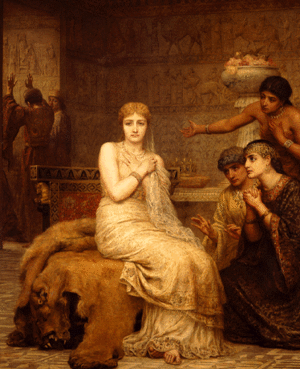Vashti, Purim, and Women's History Month
I have a vague recollection of the first time I learned about Vashti. I was sitting at circle time on a primary-colored rug in my pre-K class at Sunday school and was told, “Vashti was not nice to the King. She would not dance for the King.” And we all just nodded our heads in sympathy for King Ahashuarus. “Poor King.” We all thought, “Vashti is evil.”
I can assure you that at the age of 5, I did not know what it meant to dance or not dance for the King. And I can doubly assure you that I did not know how it could be considered a crime, but I knew that in this story there was going to be a good girl and a bad girl, and Vashti was our villain along with Haman. We may not have grogged our groggers at the mention of her name, but there was always that knowing nod. “Vashti did not dance for the king. How horrible.”
Years later, when my friends began teaching Hebrew school classes, some conversations struck regarding what we were taught in comparison to what truly happened.
“Why is Vashti the villain here? You know what really happened with Vashti, don't you?” asked my friend Dara incredulously. “She didn't want to dance naked in front of King Ahashuarus and his friends!”
“Wow.” I answered, taken aback that I never knew that. “I can’t say I blame her.”
I understand why I was never taught the real reasons for Vashti’s refusal when I was very young. I just don't understand why the mainstream story always stayed the same throughout my upbringing. I guess there may never be that great moment for a Jewish parent or Judaics teacher to say, “Hey, sit down. Here’s the real deal with Vashti. You would actually really dig her.”
I began to explore with my friends ways in which we can educate Jewish students about Jewish women who have truly fought injustice, albeit indirectly. Vashti refused to be bullied. Vashti spoke on behalf of her rights. I would have loved to have known this version of Vashti as a Hebrew school student and as a growing young woman.
As we celebrate Purim and Women’s History Month, I find myself looking for unsung heroes and wondering if they will ever be given the credit they are due. Who were the women behind the scenes and how will we ever know their stories?
There are valorous women hidden in the tales we were told as children—Vashti is far from unique in this sense. This Purim, keep in mind Women’s History Month during your celebration and storytelling. By redefining the Jewish Heroine, we can make history too.







I remember learning Vashti was really a hero. I had not been steeped in her as evil, but I got involved in Esther's bravery, etc. Your point is well taken, we have an obligation to learn more about the named and unnamed women in our history. I know there are new midrashim on Lilith, so let's look at others and do the same for them. For me, "The Red Tent" did that for Dina. I am not a scholar but I am a voracious reader and this site would be a good place to collect the stories.